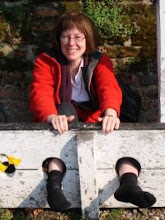It measures 70 x 80 inches.
All three quilts came from the same seller in Suffolk. His mother in law had lived in Ireland and had a stunning collection of quilts . These quilts were bought from a well known dealer ( but he could not remember the name).
The folowing information on Irish quilts comes from Rosalind Shaw:
Traditionally, Irish quilts consist of two layers - the top and the backing stitched together. They could not afford to line the quilts with wool, which would have been needed for other purposes.
Some linen merchants had a day in the week when they sold pieces of linen to their workers, for the purpose of making patchwork quilts. These linen pieces were often made into frame quilts that were very fashionable in Northern Ireland.
Belfast and Londonderry had many shirt making factories; many shirt scraps were available. The workers made the patchworks in their spare time and sold them.
The quilts were referred to as Derry quilts, Shirt quilts, and Belfast patchwork. Quilts seem to have been labelled according to their source and materials, rather than the patterns.





















































